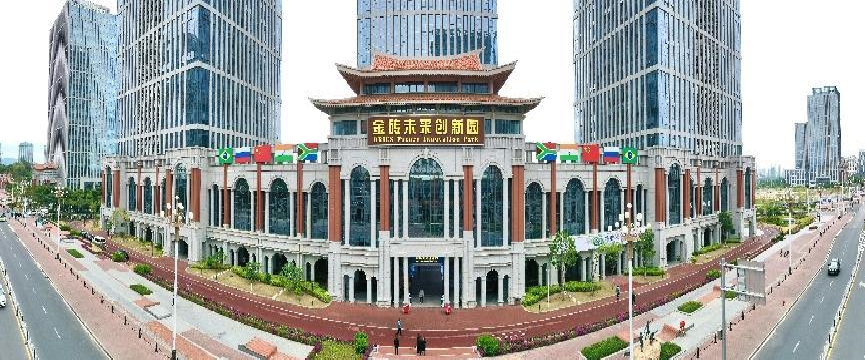By He Yin, People’s Daily
Chinese President Xi Jinping will attend the 15th BRICS Summit to be held in Johannesburg, South Africa and pay a state visit to South Africa from Aug. 21 to 24. While in South Africa, President Xi Jinping will co-chair with President Ramaphosa the China-Africa Leaders’ Dialogue.
It is believed that Xi’s visit will contribute Chinese plans and wisdom to deepening the partnership among BRICS countries and improving the BRICS cooperation mechanism. This visit is expected to draw a blueprint for the development of China-South Africa relations and China-Africa ties, making the pie of cooperation bigger and the force of progress stronger.
Since its establishment, BRICS has remained true to its founding purpose of seeking strength through solidarity, upheld the spirit of openness, inclusiveness and win-win cooperation, and deepened practical cooperation in various fields. It has become an important force driving global governance reform with increasing international influence.
China attaches high importance to the BRICS mechanism.
Since 2013, Xi has put forward a series of important proposals and initiatives during his meeting with other BRICS leaders, charting the course and providing guidelines for promoting deeper and more practical BRICS cooperation, as well as building a closer and more pragmatic partnership.
In 2017, Xi chaired the ninth BRICS Summit in Xiamen, southeast China’s Fujian province, ushering in the second golden decade of BRICS cooperation. He proposed the groundbreaking “BRICS Plus” cooperation model, and for the first time invited representatives from other emerging economies and developing countries to attend dialogues.
Last year, China once again assumed the BRICS chairmanship and hosted over 170 activities in various fields, promoting important progress in the BRICS cooperation.
The first “BRICS Plus” dialogue at the foreign minister level was held, and the “BRICS Plus” events were expanded to multiple areas including sci-tech innovation, people-to-people and cultural exchanges, and sustainable development, leaving a deep China imprint on BRICS cooperation.
It is believed that the 15th BRICS Summit will carry forward the sound momentum of cooperation from the BRICS “China Year” 2022 and chart a brighter future for BRICS.
After decades of development, the significance of the BRICS cooperation has gone beyond the five countries. The mechanism has become an important platform promoting common development and prosperity for emerging markets and developing countries.
At the High-level Dialogue on Global Development held last year, Xi proposed to foster a development paradigm featuring benefits for all, balance, coordination, inclusiveness, win-win cooperation and common prosperity, and announced a series of important measures in implementing the Global Development Initiative, leading the international community, including the BRICS countries, to seek global development with a broad vision and a long-term perspective. and to promote common development with pragmatic actions and forceful measures.
In multilateral mechanisms such as the United Nations and the Group of 20 (G20), the BRICS countries have practiced true multilateralism and worked to make the system of global governance fairer and more equitable.
South Africa’s BRICS Sherpa Anil Sooklal recently noted that more than 40 countries have expressed interest in joining the BRICS mechanism, and over 20 of them have already submitted official applications.
This fully proves that the BRICS mechanism is broadly recognized and supported by the international community, demonstrating greater vitality and appeal.
This year marks the 25th anniversary of diplomatic ties between China and South Africa. Over the past 25 years, the bilateral relations of the two countries have made historic leaps forward from partnership, strategic partnership to comprehensive strategic partnership.
Xi, who is about to pay his first state visit to South Africa in the recent 5 years, will exchange views with his South African counterpart Ramaphosa on bilateral relations and international and regional issues of mutual interest, and draw a blueprint for the growth of bilateral relations. The visit will provide a strong impetus for building a high-level China-South Africa community with a shared future.
The two heads of state will also jointly chair the China-Africa Leaders’ Dialogue, where China and African countries will discuss under the theme of “Promoting African integration and jointly building a high-level China-Africa community with a shared future.” They will have in-depth exchanges on working together to advance their modernization and foster a peaceful, just and open environment for development.
China and Africa will firmly carry forward the spirit of China-Africa friendship and cooperation, fully implement the “nine programs” for China-Africa practical cooperation, join hands in high-quality Belt and Road cooperation, and steadily promote China-Africa friendship and upgrade China-Africa cooperation.
Profound changes unseen in a century are evolving rapidly, and tremendous changes are taking place in the international landscape. Gaining a growing sense of strategic autonomy, emerging markets and developing countries are playing a more and more important role on the international stage.
China will work together with relevant countries to continuously deepen solidarity and cooperation with other emerging markets and developing countries, promote the building of a community with a shared future for mankind with responsible actions, and work together to create a better future for humanity.













